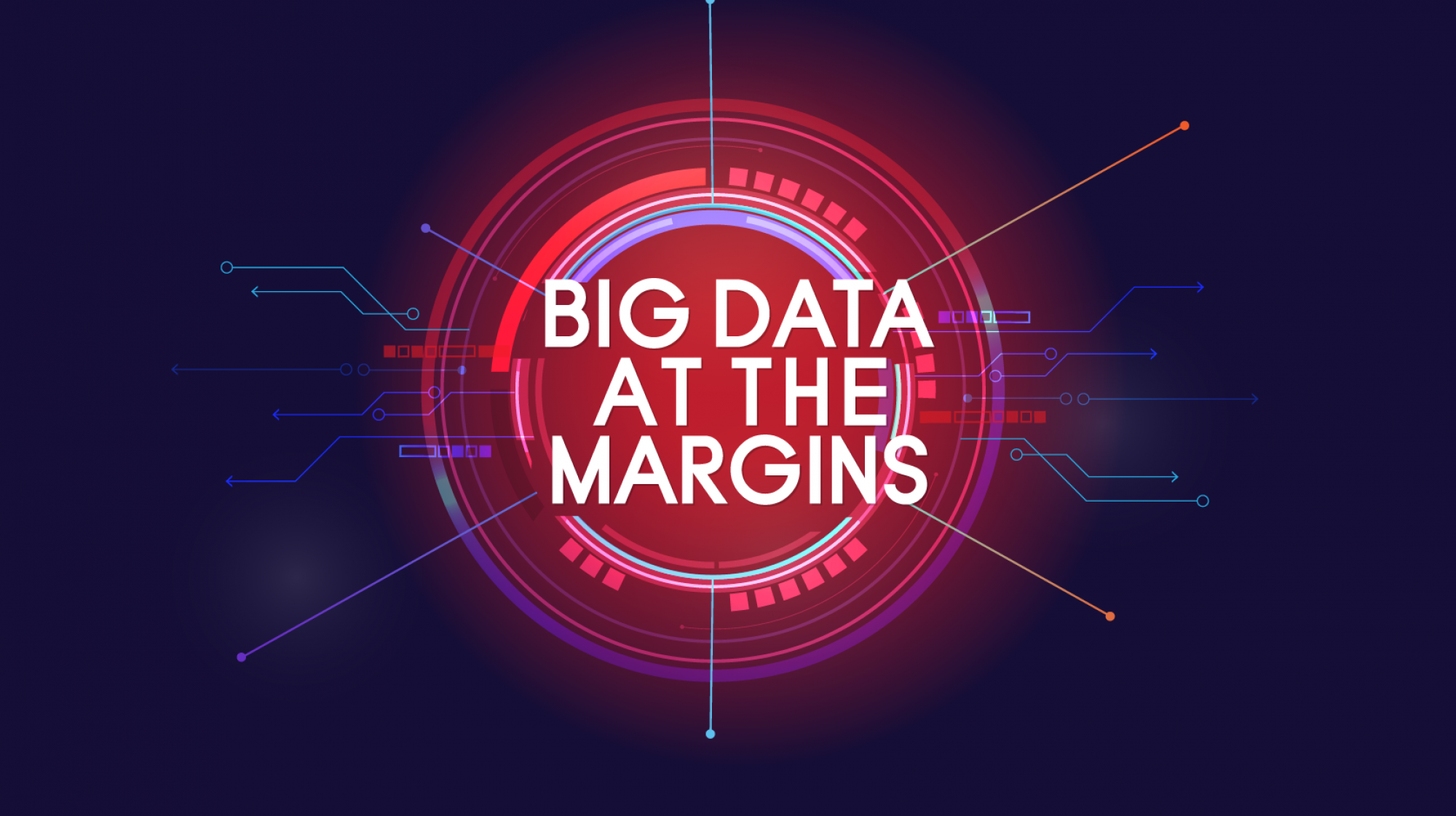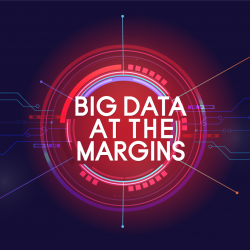Indigenous Data Sovereignty & Indigenous Futures
Webinar video | Summary | Biographies | Resources
Featuring: Jonathan Dewar (First Nations Information Governance Centre), Sofia Locklear (Western), and Jason Lewis (Concordia)
Hosted by: Alison Hearn (Western)
27 January 2022, 7:00PM
How do Indigenous peoples claim sovereignty over their data and information, and work to transform the very means, methods and values through which “data” is defined and disseminated? How can the exercise of Indigenous data sovereignty and broader computational empowerment enhance and inspire Indigenous identities, representations and futures? How can “data” be Indigenized? Why should settler scholars, organizations, and individuals learn about, support, and respect Indigenous data sovereignty?
The fifth and final event in our Big Data at the Margins series examines the growing movement of Indigenous scholars and activists working to challenge the ethical, legal, and cultural impacts of the colonial imposed and externally mandated forms of data collection about Indigenous peoples and to centre the generation of autonomous Indigenous data values and computational visions. Indigenous peoples know all too well the potential harms to well-being, politics and culture that can come from the imposition of settler-colonial data-informed policies. But even while nation-states around the world, including Canada, “commit” to enact the provisions in The United Nations Declaration on the Rights of Indigenous Peoples (UNDRIP), implementation of these provisions continues to rely on data collection by statistical agencies of nation states, NGOs and commercial interests. Uninformed by Indigenous priorities and values, these ‘scientific’ data practices inevitably reinforce the treatment of Indigenous groups as “populations” not as sovereign “peoples” with legitimate claims to their lands, cultures, and resources, including information. In addition to demanding custody and control over externally generated Indigenous data, advocates for Indigenous data sovereignty call for the re-design, collection, dissemination and use of “data” itself, and for the empowerment of Indigenous peoples to define and imagine their own narratives and futures. Autonomous data practices and broader computational skills are vital to Indigenous political and cultural autonomy.
Back to top | Webinar video | Summary | Biographies | Resources
Panel discussion summary
Jonathon Dewar discusses the importance of recognizing and embodying the great diversity within and among First Nations, and the need for nations, treaty areas and communities to control and harness the power of all of their data. Achieving data sovereignty is a corner of nation re-building. Sofia Locklear discusses the importance of Indigenizing data, and presents an evaluation framework centred around communities that focuses on identifying solutions by and for those communities, with community involvement and input throughout the process. Jason Lewis discusses the importance of developing Indigenous protocols for the development of artificial intelligence. He notes that Indigenous epistemologies are “better at respectfully accommodating the non-human.” The goal in his work is to “figure out how to treat these new non-human kin respectfully and reciprocally.”
Key themes that emerged in the discussion include:
- The importance of acknowledging and embracing the great diversity of Indigenous communities
- The need to work through the ethics of Indigenous research and data collection and management
- A focus on starting from the community, developing Indigenous data protocols, research and solutions that are driven by the community and of benefit to the community
- A recognition that Indigenous research is grounded in cultural values of land, of place, and of nurturing of future generations. This research uses Western tools (e.g. statistical software), but is not dictated by them
Back to top | Webinar video | Summary | Biographies | Resources
Biographies
 Jonathan Dewar (Huron-Wendat descended) has spent most of his 20+ year career directing research and knowledge translation initiatives on behalf of Indigenous-governed national NGOs and is a recognized as a leader in healing and reconciliation and Indigenous health and well-being education, policy, and research. Jonathan is the CEO of the First Nations Information Governance Center, located in AkweSASne Ontario and Ottawa, Ontario.
Jonathan Dewar (Huron-Wendat descended) has spent most of his 20+ year career directing research and knowledge translation initiatives on behalf of Indigenous-governed national NGOs and is a recognized as a leader in healing and reconciliation and Indigenous health and well-being education, policy, and research. Jonathan is the CEO of the First Nations Information Governance Center, located in AkweSASne Ontario and Ottawa, Ontario.
 Sofia Locklear (Lumbee) is an assistant professor in the Faculty of Information and Media Studies at The University of Western Ontario. Her research focuses on race, whiteness, and the racialization of Indigenous peoples and on Indigenous public health. She has worked with the Urban Indian Heath Institute, a Tribal Epidemiology Center serving urban Native communities across the US. Her public health work has focused specifically on developing Indigenous Evaluation Methodologies.
Sofia Locklear (Lumbee) is an assistant professor in the Faculty of Information and Media Studies at The University of Western Ontario. Her research focuses on race, whiteness, and the racialization of Indigenous peoples and on Indigenous public health. She has worked with the Urban Indian Heath Institute, a Tribal Epidemiology Center serving urban Native communities across the US. Her public health work has focused specifically on developing Indigenous Evaluation Methodologies.
 Jason Lewis (Hawaiian, Samoan) is a digital media theorist, poet, and software designer. He is also the University Research Chair in Computational Media and the Indigenous Future Imaginary at Concordia University and co-directs the Indigenous Futures Research Centre and the Aboriginal Territories in Cyberspace research network. Lewis’ creative and production work has been recognized with the inaugural Robert Coover Award for Best Work of Electronic Literature, several imagineNATIVE Best New Media awards and multiple solo exhibitions.
Jason Lewis (Hawaiian, Samoan) is a digital media theorist, poet, and software designer. He is also the University Research Chair in Computational Media and the Indigenous Future Imaginary at Concordia University and co-directs the Indigenous Futures Research Centre and the Aboriginal Territories in Cyberspace research network. Lewis’ creative and production work has been recognized with the inaugural Robert Coover Award for Best Work of Electronic Literature, several imagineNATIVE Best New Media awards and multiple solo exhibitions.
Back to top | Webinar video | Summary | Biographies | Resources
Resources
First Nations Information Governance Centre – OCAP®
“The First Nations principles of ownership, control, access, and possession – more commonly known as OCAP® – assert that First Nations have control over data collection processes, and that they own and control how this information can be used.”
Global Indigenous Data Alliance – CARE principles
“The CARE Principles for Indigenous Data Governance are people and purpose-oriented, reflecting the crucial role of data in advancing Indigenous innovation and self-determination. These principles complement the existing FAIR principles encouraging open and other data movements to consider both people and purpose in their advocacy and pursuits.”
Indigenous Protocol and Artificial Intelligence Working Group
“The Indigenous Protocol and Artificial Intelligence (IPAI) Working Group develops new conceptual and practical approaches to building the next generation of A.I. systems. The working group is interested the following questions:
- “From an Indigenous perspective, what should our relationship with A.I. be?
- “How can Indigenous epistemologies and ontologies contribute to the global conversation regarding society and A.I.?
- “How do we broaden discussions regarding the role of technology in society beyond the largely culturally homogeneous research labs and Silicon Valley startup culture?
- “How do we imagine a future with A.I. that contributes to the flourishing of all humans and non-humans?
In 2016, the IPAI produced a position paper that attempts to “capture multiple layers of a discussion that happened over 20 months, across 20 time zones, during two workshops, and between Indigenous people (and a few non-Indigenous folks) from diverse communities in Aotearoa, Australia, North America, and the Pacific.”
United Nations Declaration on the Rights of Indigenous People
“The United Nations Declaration on the Rights of Indigenous Peoples (UNDRIP) was adopted by the General Assembly on Thursday, 13 September 2007. Today the Declaration is the most comprehensive international instrument on the rights of Indigenous Peoples. It establishes a universal framework of minimum standards for the survival, dignity and well-being of the Indigenous Peoples of the world and it elaborates on existing human rights standards and fundamental freedoms as they apply to the specific situation of Indigenous Peoples.
Urban Indian Health Institute: Indigenous Evaluation
The Urban Indian Health Institute has developed an Indigenous evaluation framework that is applicable to both tribal and urban Indigenous communities. “The framework consists of four core values:
- “Community is created wherever Native people are: Evaluation starts in the creation of these communities.
- “Resilient and strength-based: Uses the tools of evaluation to identify solutions by and for the community.
- “Decolonizing data: Rigorous data must be collected and used with the intent to benefit urban Indigenous communities.
- “Centring of the community: Community involvement in evaluation is crucial to the process of reclaiming data, understanding how the work is valuable, and including community perspectives.”
Taylor, J. & Kukutai, T., eds. (2016). Indigenous data sovereignty: Toward an agenda. Australian National University Press. http://library.oapen.org/handle/20.500.12657/31875
“As the global ‘data revolution’ accelerates, how can the data rights and interests of Indigenous peoples be secured? Premised on the United Nations Declaration on the Rights of Indigenous Peoples, this book argues that indigenous peoples have inherent and inalienable rights relating to the collection, ownership and application of data about them, and about their lifeways and territories. As the first book to focus on Indigenous data sovereignty, it asks: what does data sovereignty mean for Indigenous peoples, and how is it being used in their pursuit of self-determination? The varied group of mostly Indigenous contributors theorize and conceptualize this fast-emerging field and present case studies that illustrate the challenges and opportunities involved.”
Walter, M., Kukutai, T., Carroll, S.R., Rodriguez-Lonebear, D. (2021). Indigenous data sovereignty and policy. Routledge. https://library.oapen.org/handle/20.500.12657/42782
“This book examines how Indigenous Peoples around the world are demanding greater data sovereignty, and challenging the ways in which governments have historically used Indigenous data to develop policies and programs. In the digital age, governments are increasingly dependent on data and data analytics to inform their policies and decision-making. However, Indigenous Peoples have often been the unwilling targets of policy interventions and have had little say over the collection, use and application of data about them, their lands and cultures. At the heart of Indigenous Peoples’ demands for change are the enduring aspirations of self-determination over their institutions, resources, knowledge and information systems. With contributors from Australia, Aotearoa New Zealand, North and South America and Europe, this book offers a rich account of the potential for Indigenous data sovereignty to support human flourishing and to protect against the ever-growing threats of data-related risks and harms.”
Back to top | Webinar video | Summary | Biographies | Resources

